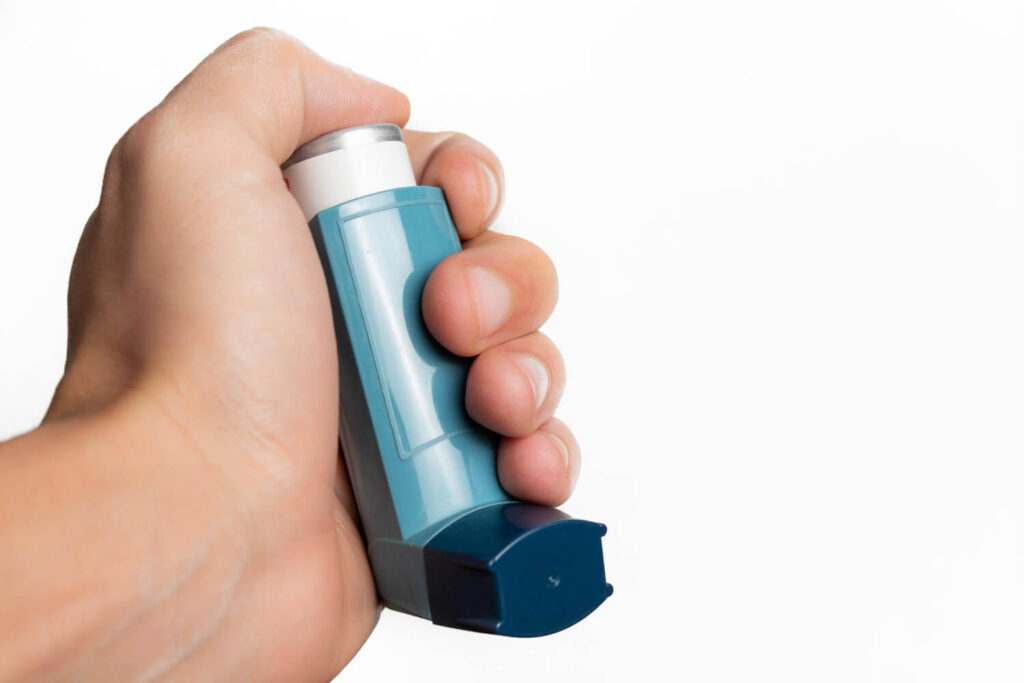There’s nothing more annoying than having a persistent dry cough. Unfortunately, it is not just a normal cough as it is also a type of asthma, which is cough variant asthma. While this is a type of asthma, it is important to understand that it is very different from bronchial asthma and its other types.
In this blog, we’ll uncover all about cough variant asthma, its symptoms, and how to properly manage this respiratory condition. Let’s begin!
Understanding Cough Variant Asthma (CVA)

Cough variant asthma (CVA) is a distinct form of asthma that is characterized by a chronic cough as the primary symptom. While classic asthma is commonly associated with wheezing, shortness of breath, and chest tightness, cough-variant asthma presents solely with a persistent cough. This type of asthma is often underdiagnosed or misdiagnosed, as the absence of typical asthma symptoms can lead to confusion.
The cough in cough-variant asthma is usually dry and non-productive, meaning it doesn’t produce mucus. This cough can last for several weeks or even months, causing significant discomfort and disruption in daily life. It is important to note that not everyone with a chronic cough has cough-variant asthma, as there are other potential causes for persistent coughing.
Identifying Symptoms of Cough Variant Asthma
One way to know that you have this type of asthma is through knowing the cough variant asthma symptoms. While the primary symptom is a persistent dry cough, there are other signs that may accompany cough-variant asthma. These symptoms can vary among individuals.
It is important to consult with a healthcare provider if you experience these symptoms.
Chronic Cough: The Primary Indicator
Chronic cough is one of the cough variant asthma symptoms and the primary indicator of cough-variant asthma. Unlike acute coughs that result from temporary respiratory infections or irritants, a chronic cough lasts longer than 6 to 8 weeks. This persistent cough is usually dry and non-productive, meaning it does not produce mucus.
The chronic cough in cough-variant asthma may be the only symptom experienced by individuals, making it important to consider cough-variant asthma as a potential cause when evaluating chronic cough. If you have a chronic cough that is not improving or is interfering with your daily life, it is crucial to seek medical help.
Other Signs That May Accompany a Cough
While the main symptom is a chronic cough, there are other cough variant symptoms that may accompany the cough. These warning signs can vary among individuals and may include:
- Wheezing
- Shortness of breath
- Gastroesophageal reflux disease (GERD
- Atopic dermatitis
If you experience any of these symptoms along with a chronic cough, it is important to discuss them with a healthcare provider. Proper evaluation and diagnosis can help determine the underlying cause and guide appropriate treatment.
Causes and Risk Factors of CVA
The exact causes of cough-variant asthma are not fully understood. However, it is believed to involve environmental factors such as the climate, allergens, etc. At the same time, individuals with a family history of asthma or allergies may be at a higher risk of developing cough-variant asthma.

Understanding these potential triggers can help individuals prevent the possibility of developing this condition. Let’s discuss these factors below!
Allergens
When it comes to cough variant asthma, patients can possibly develop the condition due to some triggers like the allergens. Several allergens can exacerbate cough-variant asthma symptoms. It is important to identify and avoid these triggers to prevent or reduce coughing episodes.
Common environmental triggers and allergens include:
- Pet dander
- Pollen
- Mold
- Dust mites`

By minimizing exposure to these triggers through proper home maintenance, regular cleaning, and using air filters, individuals with cough-variant asthma can help reduce the frequency and severity of their coughing episodes.
Family History
Meanwhile, patients must also take note that family history may also contribute to the occurrence of this condition. In terms of family history, the genetic predisposition plays a role in the development of asthma, including cough variant asthma. This genetic predisposition can influence the immune system’s response to certain triggers, leading to airway inflammation and coughing. That’s why if your relatives have asthma, it is more likely for you to develop it as well.
Climate or Environmental Factor
On the other hand, climate is also a known factor that can increase the possibility of patients experiencing cough variant asthma symptoms. The cold weather affects the patient’s breathing, resulting in breathlessness and dry cough.
Furthermore, the hot weather can also affect the patient’s health and may develop asthma. When the body can’t keep up with lowering the body heat, the patient might hyperventilate and can trigger asthma cough variant asthma symptoms.
When to Seek Medical Help

While the cough variant asthma symptoms may not be as severe as in other forms of asthma, proper diagnosis and management are crucial for maintaining respiratory health. That’s likely the case especially if the symptoms persist. Thus, showing that it is not a normal cough, but involves health threats like asthma.
Here are some situations when you should consider seeking medical help:
- Persistent chronic cough: A cough that lasts longer than 6 to 8 weeks and is not improving, it is important to consult with a healthcare provider. They can evaluate your symptoms, perform necessary tests, and determine if cough-variant asthma is the underlying cause.
- Difficulty breathing: Experience shortness of breath, wheezing, or a feeling of breathlessness along with your cough, it may indicate more severe asthma symptoms. In such cases, it is important to seek immediate medical attention.
- Severe coughing episodes: The coughing episodes become severe and are accompanied by chest pain, increased heart rate, or blue discoloration of the lips or nails, it may indicate a severe asthma attack. In such situations, it is important to go to the emergency room for immediate medical care.
Remember, your healthcare provider is the best resource for evaluating your cough variant asthma symptoms. Thus ensuring you can receive an appropriate treatment plan to resolve those symptoms.
Treatment Options for CVA
As mentioned, patients can resolve their cough variant asthma symptoms after receiving a proper diagnosis from the doctor. Usually, their treatment plan will involve medications for the inflammation, and other aspects such as managing the persistent cough. Furthermore, allergies that may have been triggered by the allergens will also need medication intervention.

While these treatments are effective for addressing asthma symptoms, there are also other methods that the doctor may prescribe. The treatment options for cough-variant asthma include:
Bronchodilator
A bronchodilator is a medication commonly used in the treatment of cough-variant asthma. Bronchodilators work by relaxing the muscles in the airways, allowing for easier breathing. One commonly used bronchodilator is albuterol. It is a short-acting medication that provides quick relief during an asthma attack.
In the case of cough-variant asthma, bronchodilators help to alleviate the coughing episodes by reducing the inflammation and constriction of the airways. By opening up the airways, bronchodilators can help to relieve the cough and improve lung function.
It’s important to note that bronchodilators are not a cure for cough-variant asthma. They provide temporary relief and should be used in conjunction with other asthma medications as prescribed by a healthcare provider. Regular use of bronchodilators can help to manage the symptoms of cough-variant asthma and improve overall lung function.
Breathing Exercises
Breathing exercises can be a helpful adjunct to the treatment of cough-variant asthma. These exercises can help improve lung function, reduce coughing episodes, and enhance overall respiratory health. Here are a few breathing exercises that may benefit individuals with cough-variant asthma:
- Diaphragmatic breathing: Also known as belly breathing, this technique involves deep inhalation and exhalation using the diaphragm. It helps to increase lung capacity and promote efficient airflow.
- Pursed lip breathing: This technique involves inhaling through the nose and exhaling through pursed lips, as if blowing out a candle. It helps to slow down breathing, reduce shortness of breath, and improve oxygen exchange.
- Controlled coughing: This technique involves a deliberate and controlled cough to clear mucus from the airways. It can help to alleviate coughing episodes and facilitate easier breathing.
It is important to consult with a healthcare provider or respiratory therapist to learn and practice these breathing exercises correctly. Regular practice of these exercises on a daily basis can help individuals with cough-variant asthma manage their symptoms and improve their quality of life.
Management and Prevention of Cough Variant Asthma
Avoiding Allergens
Avoiding allergens is a crucial aspect of managing and preventing symptoms of cough-variant asthma. Creating an allergen-free environment at home though regularly cleaning floors and surfaces can help minimize exposure to common allergens. Additionally,
Lifestyle Adjustments
Another way to ensure a healthier respiratory health, it is ideal to incorporate lifestyle adjustments into your daily routine. This includes maintaining a healthy weight through regular exercise and a balanced diet rich in fruits, vegetables, and whole grains. Physical activity not only strengthens the respiratory muscles but also improves overall lung function.
Moreover, avoiding exposure and not smoking tobacco are essential in managing symptoms and preventing exacerbations of cough variant asthma.
Drink Water
In addition, it is important to stay hydrated by drinking an adequate amount of water. Doing so can help keep the airways moist and reduce irritation that may trigger coughing episodes in individuals with cough-variant asthma.
Conclusion
Understanding the cough variant asthma symptoms is crucial for timely management and treatment. While it can provide different symptoms than a normal asthma, there’s no harm in seeking help, especially to acquire medications. Take note that this can last for about 6 to 8 weeks, which can be a serious respiratory health risk.
That’s why to ensure a functional lungs and getting rid of cough. it’s best to consult a doctor immediately. That way they can address the following symptoms and protect your respiratory health.
Book an online consultation with a pulmonologist now!



